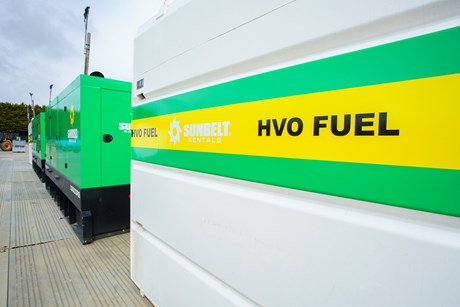What Is HVO fuel? The cleaner diesel alternative explained
blog 27 Jun 2025
As industries continue to push toward greener solutions, Hydrotreated Vegetable Oil (HVO) fuel has emerged as a viable and sustainable switch to traditional diesel. But what is HVO fuel, exactly, and is it right for your business?
Let’s explore the pros and cons and what the future holds for this renewable diesel.

What does HVO stand for?
HVO is a renewable diesel alternative made from 100% waste-derived materials like used cooking oils and animal fats. It’s a paraffinic fuel produced through a specialised hydrotreatment process, rather than esterification like FAME biodiesel.
This means HVO burns cleaner and performs better in engines compared to traditional biodiesel.
Is HVO fuel a type of biodiesel?
Yes and no. HVO fuel is often lumped in with biodiesel, but it differs in both production and performance. Unlike FAME (Fatty Acid Methyl Ester) biodiesel, HVO is free from oxygen, giving it superior storage stability and cold-weather performance.
It’s chemically very similar to fossil diesel, meaning it's a ‘drop-in’ replacement for diesel engines with no modification required.
The benefits of HVO fuel
- Lower emissions
HVO reduces net greenhouse gas emissions by up to 90% compared to conventional diesel. It also produces significantly less NOx and particulate matter - helping improve local air quality. - Reliable performance
Thanks to its clean-burning profile and excellent cold weather resistance (down to -32°C), HVO diesel is ideal for off-grid power, construction sites, transport and backup generators. - Drop-in compatibility
HVO meets EN 15940 fuel standards and is suitable for use in existing diesel engines without upgrades or blending. - Extended shelf life
Unlike FAME biodiesel, HVO has better oxidation stability, which means it won’t degrade as quickly during storage. - Made from waste
It’s derived from 100% waste feedstocks, used cooking oils, residues and animal fats, making it both sustainable and circular.
Any downsides?
- Higher cost
HVO fuel typically costs more per litre than standard diesel. However, this may be offset by fuel efficiency gains, reduced maintenance needs and carbon reduction benefits. - Limited availability
While availability is growing across the UK and Europe, supply may still be limited in certain regions. - Feedstock scrutiny
Though made from waste products, some experts argue that the increasing demand for HVO could eventually pressure global feedstock markets.
RFAS-approved renewable fuel supplier
We're committed to supporting cleaner, greener operations across all industries we serve. That’s why we’re an approved supplier of HVO under the Renewable Fuels Assurance Scheme (RFAS) as part of our Greener Solutions range, powering our generators, site equipment and temporary infrastructure with reduced environmental impact.
This independent accreditation provides verified assurance of the greenhouse gas (GHG) reductions and sustainability credentials of the HVO fuel we supply. This certification demonstrates that when you hire from us, you’re choosing a supplier that prioritises verified, ethical and sustainable fuel sourcing. It’s a powerful step in decarbonising your operations, backed by industry-leading standards.
We also provide expert guidance to help customers transition from diesel to HVO quickly and seamlessly, whether for short-term hire or long-term decarbonisation strategies.
HVO fuel FAQs
Is HVO fuel better than diesel?
In many ways, yes. HVO burns cleaner, stores longer and emits fewer harmful pollutants than conventional diesel.
Can I switch to HVO without modifying my equipment?
Yes. HVO diesel is a drop-in replacement compatible with most diesel-powered machinery, generators and vehicles.
What is HVO fuel made from?
It’s made from 100% renewable waste - primarily used cooking oils, animal fats and other sustainable feedstocks.
How much does HVO cost compared to diesel?
While prices vary, HVO fuel typically costs more than standard diesel per litre. However, long-term environmental and operational benefits can balance this out.
If you’re looking to reduce emissions without overhauling your entire fleet or fuel system, HVO fuel offers a practical and accessible solution. We’re helping businesses take those steps.
Want to learn more about how HVO could support your sustainability goals? Talk to our team today.

 Open your account online within 24 hours
Open your account online within 24 hours  Nationwide, next day delivery available
Nationwide, next day delivery available  Over 200 locations near you
Over 200 locations near you